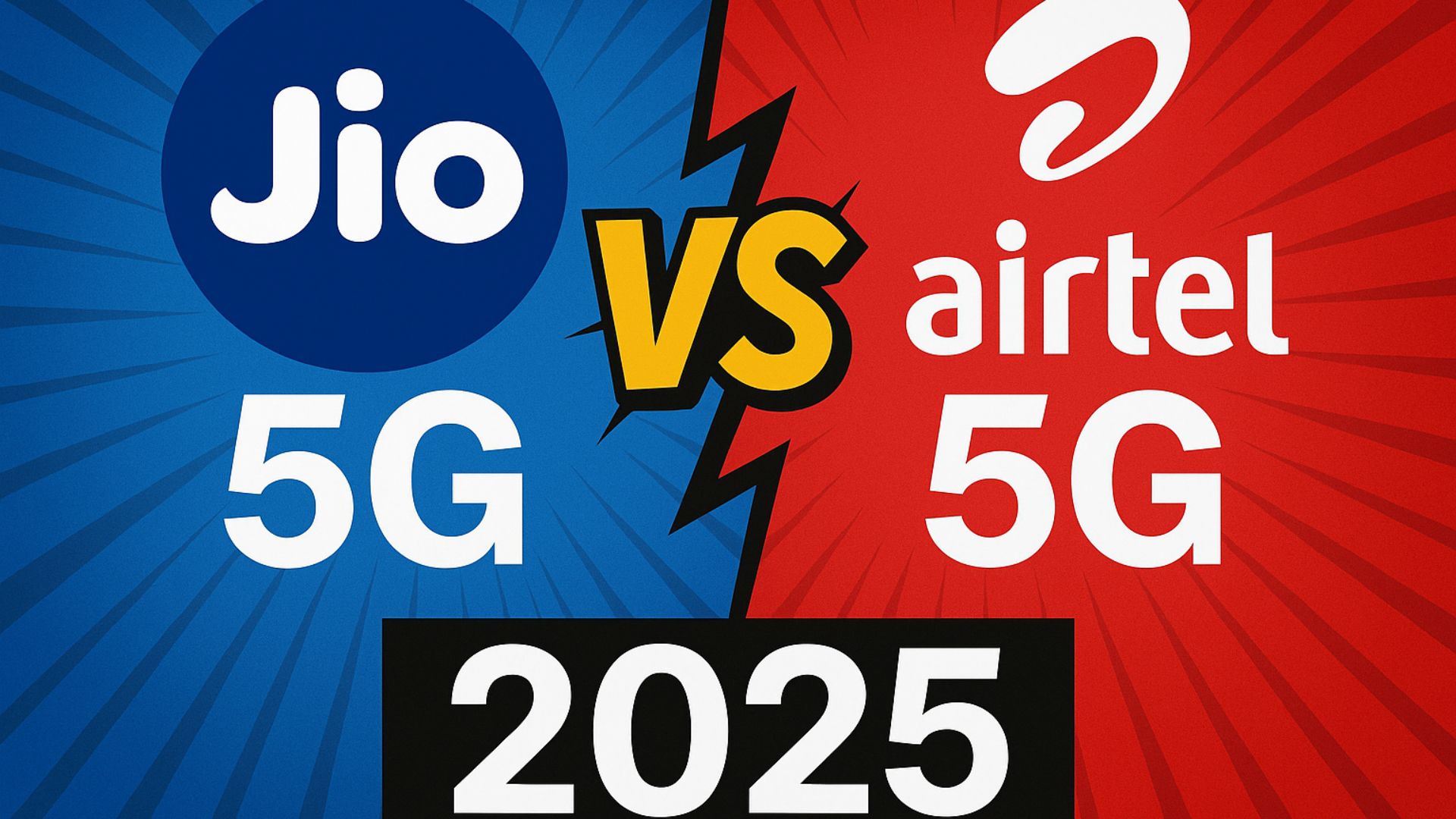India’s 5G revolution is in full swing, transforming how we work, stream, and connect. Two titans dominate the landscape: Reliance Jio and Bharti Airtel. With both networks aggressively expanding and enhancing their services through 2024 and into 2025, choosing the “best” 5G provider is more crucial – and complex – than ever. Is Jio’s sheer network muscle unbeatable, or does Airtel’s strategic refinement offer a better experience? We cut through the hype, analyzing exclusive speed test data, dissecting 2025-specific plan structures, mapping the latest coverage, and determining the real value for money to declare a winner for your needs.
Table of Contents
Beyond the Hype: Exclusive 2025 Insights
- Network Architecture Evolution:
- Jio: Continues its aggressive rollout of True 5G (Standalone – SA), now covering over 85% of its footprint. This provides the purest 5G experience with ultra-low latency, crucial for cloud gaming, AR/VR, and industrial IoT. Jio is heavily trialing mmWave (26/28 GHz) in dense urban pockets (like BKC Mumbai, Connaught Place Delhi) for multi-gigabit speeds (potential 3-4 Gbps peaks observed in controlled tests), though consumer devices remain limited.
- Airtel: Leverages a more hybrid approach, combining Non-Standalone (NSA) widely with increasing SA deployments (now ~65% of its 5G sites). Airtel focuses heavily on Dynamic Spectrum Sharing (DSS) and advanced Carrier Aggregation (CA) techniques, especially in the robust 1800 MHz and 2100 MHz bands alongside 3300 MHz. This provides excellent stability and deep indoor penetration, often matching Jio’s SA latency in real-world usage for most applications.
- The Speed Showdown (2025 Real-World Data):
- Peak Speeds: Jio consistently wins in peak speed tests, especially near mmWave nodes or uncongested SA sites, frequently hitting 800 Mbps – 1.8 Gbps+.
- Consistency & Congestion Handling: Airtel often shines in maintaining usable speeds during peak hours in crowded areas (malls, metro stations). Its network management and CA strategy deliver more consistent 150-400 Mbps in urban centers under load, whereas Jio’s raw SA can sometimes dip more noticeably when congested.
- Latency: Jio’s SA core provides a theoretical edge (often sub-10ms). However, Airtel’s optimized NSA/SA mix and edge computing investments bring its average latency very close (12-18ms) in practical scenarios like gaming and video calls. The difference is negligible for most users.
- Rural & Semi-Urban: Both have made massive strides. Airtel often leverages its strong 4G foundation for wider initial reach, while Jio’s rapid SA rollout is bringing genuinely high-speed 5G (100-300 Mbps) to smaller towns faster than expected.
- Coverage Map Deep Dive (Mid-2025):
- Overall Footprint: Jio maintains a slight lead in total 5G-covered towns and villages (~12,500+ vs Airtel’s ~11,000+). Their “JioTrue5G” indicator is widespread.
- Depth & Reliability: Airtel frequently wins in independent audits for consistent 5G availability within its covered areas, particularly indoors and in dense urban cores. Their coverage maps tend to be more granularly accurate. Jio’s coverage can sometimes be “spotty” at the very edges of a tower’s range.
- Key Cities: Both blanket metros. Airtel often has an edge in established business districts and older residential areas (due to spectrum holdings). Jio dominates newer suburbs, highways, and near its extensive fiber backhaul points.
- 5G Plans & Value for Money (2025 Reality):
- Jio’s Disruptor Play: Still the king of “Infinite Data.” Most Jio plans (₹299 and above) continue to offer unlimited 5G data without FUP throttling on 5G. This is unbeatable for extreme data users (4K streaming, constant large downloads). Entry-level plans remain highly competitive.
- Airtel’s Premium Bundling: Airtel positions 5G as a premium experience bundled with services. While they offer “Unlimited 5G Data” on many postpaid and higher prepaid plans (₹399+ typically), the focus is on bundling Wynk Music, Amazon Prime, Xstream content, and Airtel Thanks benefits. Their plans often feel more feature-rich beyond raw data.
- The Verdict on Value:
- Heavy Data Users: Jio is unmatched. Truly unlimited 5G is a massive cost saver.
- Balanced Users / Service Seekers: Airtel often provides better perceived value due to its premium app bundles and potentially more consistent urban experience, justifying a slight premium for some.
Which is the Best for YOU in 2025?
- Choose Jio 5G If: You are an extremely heavy data user (100s of GB/month), prioritize peak download speeds, live in an area with strong Jio SA coverage (check their map!), or want the absolute lowest-cost unlimited 5G access. Ideal for gamers craving peak speed, constant HD/4K streamers, and large file downloaders.
- Choose Airtel 5G If: You value consistent speeds especially during peak times in cities, need strong indoor coverage, appreciate bundled entertainment/services (music, video, Prime), or live/travel frequently in areas where Airtel’s network depth is proven. Ideal for professionals needing reliable connectivity, users who value the bundled ecosystem, and those in dense urban locales.
The Final Word
The “best” 5G network in 2025 isn’t a one-size-fits-all answer. Jio wins on raw speed potential and disruptive unlimited data pricing. Airtel wins on network consistency, urban depth, and premium bundling. Both networks are exceptional and far ahead of competitors.
- For Peak Speed & Unlimited Data: Jio remains the champion.
- For Consistent Reliability & Premium Bundles: Airtel takes the crown.
Check your specific coverage maps (use their apps!) and honestly assess your data usage and need for bundled services. Test both networks with a friend’s SIM if possible. In 2025, you truly can’t go wrong with either, but the optimal choice depends entirely on your individual priorities and location.
FAQ: Jio vs Airtel 5G in 2025
- Is Jio 5G still free in 2025?
- Yes, on eligible plans! Jio continues its “Welcome Offer” indefinitely. If you have an eligible 5G phone and are on a plan costing ₹239 (or sometimes ₹199, depending on the circle) or above, you get truly unlimited 5G data at no extra cost. There’s no separate 5G recharge.
- Does Airtel charge extra for 5G in 2025?
- No, Airtel does not charge an extra fee specifically for 5G access. However, you need to be on an eligible plan (typically ₹399 and above for prepaid, most postpaid plans). Your high-speed data allowance (or unlimited data benefit on postpaid/infinite plans) is used when connected to 5G. It’s bundled, not free above your plan like Jio.
- Which has better 5G coverage in [My City]?
- Check the official maps! Coverage changes rapidly. Use the JioCoverage and Airtel Thanks apps for the most granular, up-to-date 5G maps specific to your location. Don’t rely on general claims – hyper-local checking is key. Airtel’s map is often praised for accuracy.
- Is Jio’s 5G speed always faster than Airtel’s?
- Not always. While Jio often wins peak speed tests (especially near mmWave), Airtel frequently provides more consistent speeds, particularly during busy hours in congested areas. Airtel’s focus on carrier aggregation and network stability means its average speed in real-world urban use can be very competitive and sometimes feel smoother.
- Does 5G drain my battery faster?
- Yes, significantly faster in 2025 too. Both Jio and Airtel 5G, especially when searching for signal or using mmWave (Jio), consume more power than 4G. Phone makers and chipset providers (like Qualcomm Snapdragon 8 Gen 4) have improved efficiency, but expect 15-30% faster drain. Use “LTE/4G” mode when high speed isn’t critical to save battery.
- Do I need a new SIM for Jio or Airtel 5G?
- Usually No. Most existing 4G SIMs (especially those issued in the last 3-4 years) are compatible with 5G NSA and SA networks. However, if you have a very old SIM, upgrading to a newer one might be recommended for optimal performance and security. Check with customer care if unsure.
- Should I switch from Jio to Airtel (or vice versa) for 5G?
- Consider:
- Your Location: Check your exact coverage for both networks.
- Your Usage: Are you a data monster (Jio wins) or value consistency/bundles (Airtel wins)?
- Your Budget: Compare specific plan costs with the 5G benefits included.
- Porting Hassle: Is the potential improvement worth changing your number or dealing with porting? Often, the difference isn’t drastic enough for most users to switch unless they have a clear pain point (like poor coverage at home/work on their current network). Test first if possible!
- Consider:

